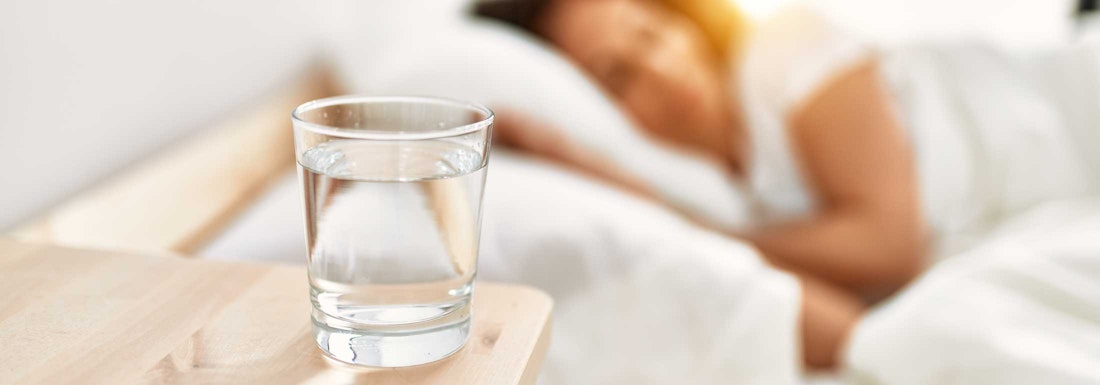13 Oct 2025

What is the Impact of Dehydration on Sleep?
13 Nov 2024
Maintaining proper hydration is essential for various physiological functions, one of which is sleep. When your body is not adequately hydrated, your sleep can be negatively affected. Dehydration can disturb your sleep-wake cycle and decrease the overall quality and duration of your sleep. Ensuring you are well-hydrated can help regulate your body temperature and maintain the balance of minerals and electrolytes necessary for good sleep health.
It's important to consider your water intake throughout the day and to incorporate hydrating foods into your diet. Being mindful of factors that increase the risk of dehydration, such as high temperatures, excessive exercise, or illness, is also key to preventing its impact on your sleep. Although it's advisable to reduce fluid intake shortly before bedtime to avoid disrupting your sleep with nighttime bathroom trips, a small drink of water before bed can help maintain hydration levels throughout the night without causing significant sleep disturbances.
If you experience symptoms such as headaches, dry mouth, or muscle cramps during the night, these could be signs of dehydration that may interfere with your sleep. Addressing these symptoms promptly by rehydrating can help improve the quality of your rest and contribute to a more refreshing sleep experience.
Dehydration and Sleep Quality
Maintaining proper hydration is pivotal for various aspects of health, including your sleep. Dehydration can negatively affect sleep patterns and potentially exacerbate sleep disorders.
Effects on Sleep Patterns
When you are dehydrated, your body may struggle to regulate its temperature, which is crucial for entering sleep and maintaining deep sleep stages. Research indicates that dehydration can interrupt your natural sleep-wake cycle, known as the circadian rhythm, and may shorten the overall duration of your sleep.
Influence on Sleep Disorders
Dehydration might worsen certain sleep disorders, such as sleep apnea, due to increased mucus viscosity and airway resistance. Additionally, a lack of adequate fluid intake could lead to nocturia – frequent night-time urination – which can interrupt sleep and reduce its quality. It's important to balance your fluid intake to avoid disrupting your sleep with excessive bathroom trips.
Physiological Implications of Dehydration
Dehydration can significantly impact your sleep by interfering with your body's natural processes. Understanding its effects on circadian rhythms and hormonal balance is crucial for maintaining optimal sleep health.
Impact on the Circadian Rhythm
Your circadian rhythm, essentially your body's clock, regulates sleep patterns by responding to light and darkness within your environment. Dehydration can disrupt this sensitive balance, shifting the timing of sleep and wakefulness. Inadequate hydration impacts the production of melatonin, the hormone responsible for inducing sleep, which in turn can alter your natural sleep-wake cycle.
Effects on Hormonal Balance
The balance of various hormones, including cortisol and vasopressin, is essential for a restful night's sleep, and dehydration can disrupt their normal levels. Cortisol, known as the stress hormone, typically decreases at night, allowing for relaxation and sleep. However, when you're dehydrated, cortisol levels can remain high, preventing the onset of sleep. Similarly, vasopressin, which helps to regulate fluid balance in the body, is released during the night to decrease urine production. Dehydration can lead to higher levels of vasopressin, which can cause you to wake up to use the bathroom, thus interrupting your sleep.
Cognitive and Emotional Consequences
Understanding the effects of dehydration on your sleep involves recognising how your cognitive functions and emotional well-being are interconnected with your sleep quality.
Impact on Cognitive Functions
Your brain's performance is closely linked to your hydration status. When you become dehydrated, even mildly so, you might experience symptoms such as fatigue and reduced mental focus. Research indicates that dehydration can lead to difficulties in maintaining attention, impairments in short-term memory, and can affect your ability to perform tasks that require complex problem-solving or coordination. These cognitive deficits can translate into sleep disturbances as your brain struggles to wind down.
Emotional Well-being and Sleep
Dehydration is not only a risk to your cognitive functions but also to your emotional state. You might notice mood changes like irritability or a general sense of unease, which can arise from inadequate hydration. Poor emotional regulation, as a consequence of dehydration, may negatively affect your sleep patterns, as it can make it harder to fall asleep or lead to restless nights. Regular hydration can help maintain a balanced mood, contributing to healthier and more restorative sleep.
Preventative Measures and Management
Proper hydration is essential to maintaining a healthy sleep cycle. Dehydration can negatively affect your sleep quality, so it's crucial to manage fluid intake effectively.
Hydration Strategies for Better Sleep
Hydrating adequately throughout the day can ensure that your sleep is undisturbed by the symptoms of dehydration. Here are specific strategies:
- Consistent Water Intake: Aim for regular sips of water during the day, rather than consuming large amounts at once. This will provide your body with a steady supply of fluids.
- Balance Fluids Before Bedtime: To minimise waking up for bathroom trips, reduce your fluid intake an hour before you sleep, ensuring you've hydrated well throughout the day.
Lifestyle Adjustments for Optimal Hydration
In conjunction with hydration strategies, certain lifestyle adjustments can enhance your body's hydration status:
- Incorporate Hydrating Foods: Consuming foods with high water content, such as cucumbers, tomatoes, oranges, and melons, can boost overall fluid intake.
- Monitor Environmental Factors: Be mindful of environments that may increase your risk of dehydration, such as heated or air-conditioned rooms, and adjust your water intake accordingly.
Frequently Asked Questions
Dehydration can significantly affect your sleep quality and lead to symptoms that may disrupt your night's rest. Below are frequently asked questions that address common concerns related to the impact of dehydration on sleep.
What are the symptoms of insomnia attributed to dehydration?
If you're experiencing insomnia, dehydration might be a contributing factor. Common symptoms include a dry mouth, headache, and muscle cramps, all of which can interfere with your ability to fall or stay asleep.
How can one prevent dehydration during sleep?
To prevent dehydration during sleep, ensure you're well-hydrated throughout the day. Limit caffeine and alcohol intake before bedtime as they can increase urine production, and opt for a small glass of water before you sleep to minimise waking up thirsty.
What are the risks of sleeping while severely dehydrated?
Sleeping while severely dehydrated can exacerbate the effects of dehydration, potentially leading to more pronounced symptoms such as dizziness, rapid heartbeat, and confusion upon waking. In severe cases, it may cause health complications that require medical attention.
What signs indicate one has awoken in a state of dehydration?
Common signs indicating you've awoken dehydrated include feelings of intense thirst, a dry or sticky mouth, reduced urine output that is darker in colour, and feeling lightheaded or dizzy.
Can an excess of sleep be due to dehydration?
Although uncommon, dehydration can sometimes lead to lethargy and excessive sleepiness as your body attempts to conserve energy to deal with the deficit of fluids.
Do electrolyte imbalances from dehydration disrupt sleep patterns?
Yes, electrolyte imbalances caused by dehydration can disrupt normal sleep patterns. They can lead to symptoms such as muscle cramps and restlessness, which can make it difficult to maintain a consistent sleep cycle.


